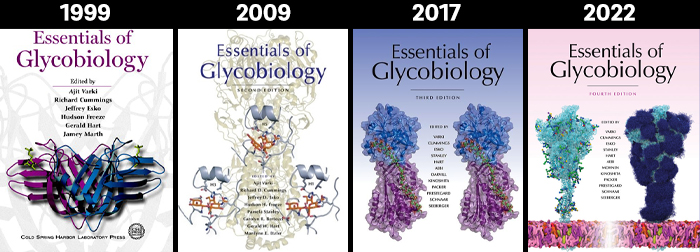Editors of “Essentials of Glycobiology” Recognized for Their Impact on Scientific Collaboration

The editors of Essentials of Glycobiology, published free online for more than 20 years, were recognized with the Distinguished Serve Award from the Society for Glycobiology.
Sharing knowledge is critical for the progress of science. By increasing collaboration and encouraging innovation collectively, the world becomes a more accessible space for growth, development and advancement. For the editors of Essentials of Glycobiology, widely considered the authoritative textbook in the field, sharing knowledge is at the heart of their efforts.
Published by Cold Spring Harbor Laboratory Press (CSHLP) and offered free online for more than 20 years, the current and past editors of the book were recognized at the Society for Glycobiology’s annual conference with the society’s Distinguished Service Award in November 2024.
“The Society Board recognizes the sustained effort and altruistic contributions that drove the creation, production, and enduring impact of a textbook which continues to serve as an invaluable resource for capturing and communicating knowledge in glycobiology,” the society noted in a statement about the award. “It is highly unlikely that any member of our Society is not familiar with this textbook and exceedingly likely that all members have held, read and referred to its contents at one point or another.”
Ajit Varki, M.D., Distinguished Professor in the Departments of Medicine and Cellular and Molecular Medicine at University of California San Diego School of Medicine, served as executive editor for all four editions of the textbook, working with Jeffrey Esko Ph.D., Distinguished Professor in the Department of Cellular and Molecular Medicine and past co-director with Varki of the Glycobiology Research and Training Center (GRTC) at UC San Diego, as well with many other experts worldwide
The decision to share the book freely online for the last two decades occurred almost by happenstance. It was the late 1990’s and the Internet was just getting started when Varki was serving as editor in chief for the Journal for Clinical Investigation (JCI). Taking advantage of fiscal reserves built up over the years, Varki had the idea to offer the journal free online to everyone. It was the first major biomedical journal to be freely available in such an open format (the term “open access” was not coined until more than 10 years later). Riding on the success of the online journal experiment Varki asked David J. Lipman, M.D., then director of the National Center for Biotechnology Information (NCBI) if it was possible to similarly share the textbook online for free.
“NCBI accepted a proposal to make the entire book freely available at the online NCBI Bookshelf for searching and reading by anyone anywhere in the world with an internet connection—eventually including downloadable slides for each figure,” said Varki. “With this model, everybody wins. The information is freely available as a service to the scientific community. Any remaining income, after covering production costs, is used to further the impact of the book in the scientific community. Also critical to the success of this venture were long-term program project grants to the GRTC and the Department of Cellular and Molecular Medicine from the National Heart, Lung, and Blood Institute (NHLBI).”
What is Glycobiology?
Glycobiology is the study of glycans (also known as carbohydrates or sugar chains) and their numeral and diverse roles in biological systems. It focuses on the structure, function, and biology of glycans, which are essential components of many cellular processes. In glycobiology, researchers look at how glycans influence various biological phenomena, including disease mechanisms, cellular communication, and the interactions between cells and their environments. It is a field with implications for medicine, biomedicine and biotechnology.
“The goal of barrier-free access to scholarly information online has preoccupied academic researchers for more than two decades,” wrote CSHLP Director John Inglis; Rita Sarkar, program officer at NHLBI and Steve Sherry, acting director of the National Library of Medicine, in the foreword to the latest edition of the textbook. “Amid the arguments about paths forward, the 20-year success of Essentials of Glycobiology in achieving the goal is less well-known than it should be. That success is attributable to a unique partnership between two not-for-profit institutions and a consortium of scientist–editors.”
More than 120 scientists worldwide worked on the current edition of the book, and discussions are beginning about the future, to be determined by a new generation of leaders. Usage data from 2011-present indicate that the book has been accessed by more than 2.5 million unique IP addresses.
Varki, who grew up in India, where his grandfather was a friend of Mahatma Gandhi, is deeply grateful for the team of experts who all came together to continue the work of educating scientists about glycobiology.
“As a child, I learned that some great things have been done by people who claim little credit, nor have any controlling leadership title,” said Varki. “I’m honored to be accepting the award on behalf of all the editors and co-authors, as well as many at the NCBI, CSHLP and the UC San Diego GRTC who made this work possible.”
Notably, while the biological roles and biomedical significance of glycans still get limited attention compared with those of DNA, RNA and proteins, high praise for the previous editions of Essentials of Glycobiology has come from 10 Nobel Laureates.
In addition to Varki and Esko at UC San Diego, other current and past editors are Richard Cummings Harvard Medical School; Pamela Stanley, Albert Einstein College of Medicine; Markus Aebi, ETH Zürich; Taroh Kinoshita, Osaka University; Nicolle H. Packer, Macquarie University; Ronald L. Schnaar, Johns Hopkins University; Peter Seeberger, Max-Planck-Institute; Carolyn Bertozzi, Stanford University; Marilynn E. Etzler, UC Davis; Hudson Freeze & Jamey Marth, Sanford Burnham Prebys; Gerald Hart, James Prestegard, Alan Darvill & Debra Mohnen, University of Georgia.
— Joyce Pritchett
Communications Specialist, UC San Diego School of Medicine
